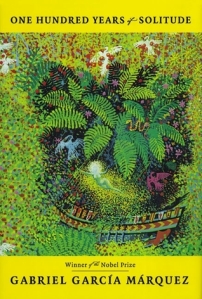This was one of those books that I thought we’d touch on in my Spanish literature courses in college, but I took Iberian literature and as Garcia Marquez is Colombian, he was absent. I found a copy of this book at the library book sale and picked it up, thinking I’d enjoy reading it in English if I couldn’t find it in Spanish. I even convinced my book club to read it and I volunteered to lead the discussion. Let’s just say I’m regretting this a little.
 One Hundred Years of Solitude by Gabriel Garcia Marquez
One Hundred Years of Solitude by Gabriel Garcia Marquez
Summary from Goodreads:
The novel tells the story of the rise and fall of the mythical town of Macondo through the history of the family. It is a rich and brilliant chronicle of life and death, and the tragicomedy of humankind. In the noble, ridiculous, beautiful, and tawdry story of the family, one sees all of humanity, just as in the history, myths, growth, and decay of Macondo, one sees all of Latin America.
Love and lust, war and revolution, riches and poverty, youth and senility — the variety of life, the endlessness of death, the search for peace and truth — these universal themes dominate the novel. Whether he is describing an affair of passion or the voracity of capitalism and the corruption of government, Gabriel Garcia Marquez always writes with the simplicity, ease, and purity that are the mark of a master.
Hm. I’m not sure where to start. A good friend of mine advised keeping a family tree nearby as I read and I flagged the one in the opening pages of my copy but I was so often confused about who was who that I didn’t bother to reference it much. The characters share names, particularly Jose Arcadio and Aureliano and after a few generations of these names repeated, it was hard to keep straight who was dead, alive, or just missing for a bit. The characters would come and go for large chunks of the book at a time and return suddenly. It was maddening to keep track of. I’ve said before I don’t do well with magical realism and this book coined the term. There were butterflies following around lovers and four years of rain without stop. Of course, it’s all full of meaning. Or something like that.
It was the incredulity of the characters that made the story so fantastical. Ursula lived to be over one hundred, as did Pilar Ternera. Jose Arcadio lived strapped to a tree for years while Remedios the Beauty ascended into heaven. Certain characters were more believable, like Petra Cotes or even Fernanda. But they were all impulsive and did things no human should have survived. I understand this is my biggest complaint about magical realism and I’m only going to make it again for the next book I read. I should really stop.
Ursula was the only character I really liked. She was in the story long enough for me to have an attachment to her and she never did anything too unbelievable besides living so long. She cared about her family a lot and was steady when a lot of them were fighting wars at home or abroad. She was what the matriarch of the family should be.
The only thing I related to in the book was Ursula’s sense of the importance of family. I felt that the characters were caricatures of people and they were hard to relate to. Ursula’s insistence on protecting her family and finding ways to welcome everyone was the thing I related to more than anything else. It was a book where the ideas more than the characters spoke to me.
I liked the humor of the book. There were moments or characters that among the tragedy and depression of the book where very lighthearted. Fernanda’s inability to make coffee or the children telling Ursula she was being buried alive were fun and welcome in the drudgery of the novel.
My biggest complaint with this book is that the characters didn’t last long enough for me to connect with them. They would come, disappear for a while, reappear for enough time to have children and die. Plus they all had the same names and I never remembered which Aureliano was which. The characters that lasted a while, Ursula and Melquiades, I was able to connect with and I did enjoy. I wish more of the characters had survived long enough to make an impact on me.
Gosh, there’s a lot to talk about when it comes to symbolism in this book. The rise of Macondo and it’s demise at the hands of modernization is an obvious one. Coming to peace with change and death could be one as well. Destiny is a good one and I’ll settle there. The men who shared names tended to share a destiny. Aureliano’s were violent and it seemed that it couldn’t be escaped for an Aureliano to have a violent part of his life. They were destined from the time they were born. The men of the family repeated each other’s obsessions. Making things with their hands and discovering secret knowledge seemed to be big ones. The family was predisposed to each other and the destiny of each member was tied to the destiny of the others. I’m not sure how I feel about that in practice. I’m told I’m like my grandmother but I don’t think I’m going to repeat major parts of her life in my time because of that. (Side note, we don’t share a name.) I think it’s just a similarity and nothing more. Maybe that’s why there’s no book about the Stevens.
Writer’s Takeaway: The saving grace of this book to me was the writing. Marquez wove beautiful sentences and had amazing quotes to pull from the story. But as a reader, I needed more consistency. Having characters appear and disappear was very demanding and I wasn’t able to devote the time to pay attention enough to follow it. With the YA audience I’m writing for, I need to make sure my characters stay put a while longer.
Hard to enjoy but hard to ignore the beautiful prose.
This book fulfills the 1960-1979 time period based on its publication date for the When Are You Reading? Challenge.
Until next time, write on.
You can follow me on Goodreads, Facebook, Twitter, Pinterest, and Instagram. I’m available via email at SamAStevensWriter@gmail.com. And as always, feel free to leave a comment!
Related Posts:
‘One Hundred Years of Solitude’ by Gabriel Garcia Marquez | notesfromzembla
Book Response: One Hundred Years of Solitude – Gabriel Garcia Marquez | Antony Millen
One Hundred Years of Solitude | Vacation Reads



Nailed it! Great review! I made the even greater mistake of reading it in Spanish which I think only added an extra layer to my confusion 🙂
And your writer’s takeaway is really interesting. I’ve recently received some editorial feedback on the first three chapters of my novel (I’m posting about that later today) and one of the things he mentioned was that I’d introduced too many characters too quickly. As you say, best to introduce them slowly and have them hang out with the reader for a while so they will be able to remember who’s who.
It may have been a trial, but at least you’ve read it! (I wanted a medal – haha!)
LikeLike
I’d gladly take a medal for finishing that one. I’m glad I tackled it in English. I received similar feedback about the number of characters in the opening chapters of my novel. I ended up cutting one and I think it simplified the whole plot to have her gone. It’s a lot of edits, but I felt my readers could relate to my remaining characters more. Good luck revising! Happy reading (and writing)!
LikeLiked by 1 person
I am very impressed you made it through this book. I can’t stand books with too many characters or characters that come in and out of the book too quickly to grow attached. I become confused and apathetic.
How did your book club like this?
LikeLike
There were two (out of ten or so) that really enjoyed it. The one woman is a psychologist who looked at it as a study of grief. The other gentleman who liked it has read it three times and enjoys it more each time. I’m doing a full post on my book club’s thoughts. It will go up next Thursday. Happy reading!
LikeLiked by 1 person
Oh wow. I always wondered how books look through the eyes of psychologists and if they had to put aside their professional knowledge to enjoy them (or all of the other scenarios). Looking forward to the full post 🙂
LikeLiked by 1 person